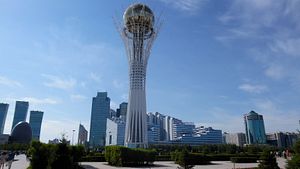Next week, from January 23 to 25, the Kazakh capital will host peace talks sponsored by Russia, Turkey, and Iran between a delegation of Syrian rebels and the government of Bashar al-Assad. Kazakhstan’s role, as that of a neutral venue, is important but will sink into the background as the negotiations (and the organizers) take center stage.
Russia, the Syrian government’s major ally, has led the effort to organize talks in Astana, which gained momentum after rebels suffered a major defeat in Aleppo last month.
Past peace talk initiatives — specifically the UN-backed Geneva process — stalled early last year. The Saudi Arabian-backed High Negotiation Committee (HNC), which has been considered the main opposition umbrella group, took part in those talks, but is not directly involved in the Astana talks. In its place will be a delegation of rebels led by Mohammad Alloush. Alloush, who had been the HNC’s chief negotiator in the short-lived Geneva talks, resigned last spring.
According to Reuters, the rebel groups that will be represented at the Astana talks include Free Syrian Army (FSA) factions, some of which were among those pushed out of Aleppo, and Alloush’s faction, Jaish al-Islam.
An FSA official told Reuters, “The factions will go and the first thing they will discuss will be the matter of the ceasefire and the violations by the regime.” Another official, Zakaria Malahifji from the Fastaqim rebel group, said a majority of groups had decided to attend and the major focus would be a ceasefire and humanitarian concerns. The rebels that spoke to Reuters said that broader political issues would not be on the table.
The rebels, in their comments to Reuters, seem to be hedging expectations. One motivation for this could be the warming ties between Turkey, which has backed the rebels , and Russia, which has stood firmly behind the Syrian government. Russia and Turkey have an interest in corralling their respective proxies into peace.
The unnamed FSA official told Reuters, “This will be a test for the Russians as the guarantor.”
While the rebels are hedging, Russia is also tailoring the talks to manage expectations. According to Malahifji, “the Russians are focusing very much on the military factions.”
Over last weekend, news broke that Moscow has invited the United States to participate. Washington, to date, has not been involved in organizing the Astana talks and the talks will take place a mere three days after Donald Trump assumes the presidency. The invite by Russia, especially significant if an agreement is reached at the talks, was characterized by the Washington Post as “the first indication of the enhanced U.S.-Russia cooperation that President Vladimir Putin and President-elect Donald Trump have forecast under a Trump administration.”
A transition official told the Post that the invite was extended via Trump’s national security advisor designee, Michael Flynn, during a December 28 phone call with Russia’s U.S. ambassador. The rash of phone calls — which began the day before the Obama administration expelled 35 Russian spies — between Flynn and the Russians has drawn sharp criticism.
It’s unclear whether the new U.S. administration will send anyone to the talks. The Trump transition has lagged behind the schedule of previous presidential transitions when it comes to vetting nominees and filling political appointments.
What’s more clear, however, is that Iran doesn’t want the United States in attendance, even if Russia, Turkey, and Syria seem open to it.
“We have not invited them, and we are against their presence,” Iranian Foreign Minister Mohammad Javad Zarif said Tuesday, according to the Tasnim news agency. Wednesday, Iranian Foreign Ministry spokesman Bahram Ghasemi told AFP, “Any enlargement [of the talks] could increase the risk of failure.”
Iranian President Hassan Rouhani said, “Some countries are not attending the talks, and their role was destructive. They were helping the terrorists.” He was referencing the United States and Saudi Arabia.
Syrian Deputy Foreign Minister Faisal Mekda said the United States “will have to prove its sincerity about settling the Syrian crisis.” He urged Washington to put pressure on Turkey, Saudi Arabia, and others to stop supplying rebel groups.
In all the discussion about peace talks, there has been little mention of the Islamic State.

































